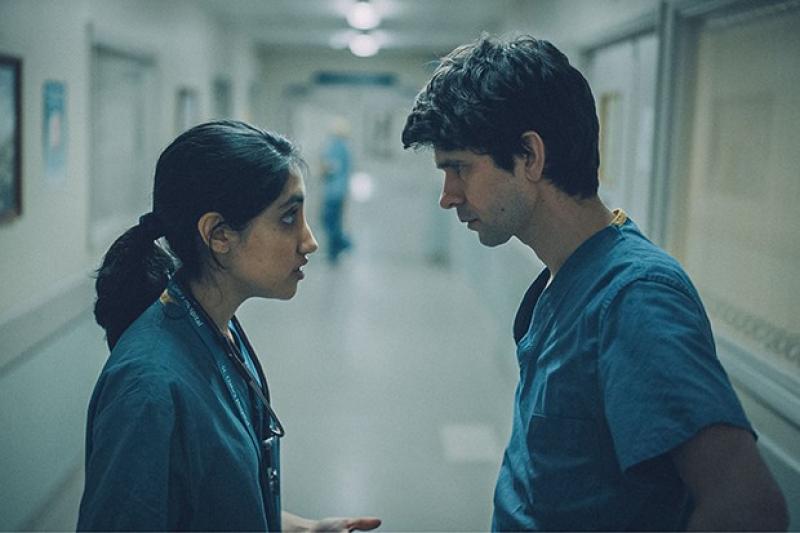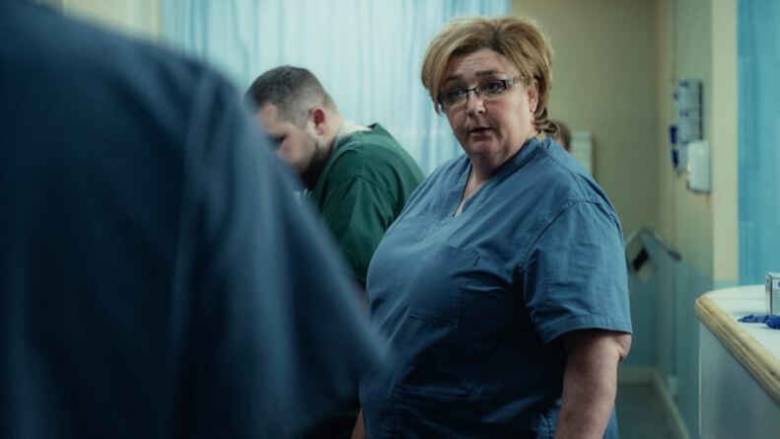This Is Going To Hurt, BBC One review - hospital drama with a realistic difference | reviews, news & interviews
This Is Going To Hurt, BBC One review - hospital drama with a realistic difference
This Is Going To Hurt, BBC One review - hospital drama with a realistic difference
Ben Whishaw is supremely nuanced as the screen alter ego of obstetrician Adam Kay

Painful more often than funny, this is not This Is Going To Hurt, the laugh-one-moment-rage-the-next book by obstetrician turned comedian Adam Kay. He’s written the script so essential truths remain. But the on-screen Adam Kay, national treasure Ben Whishaw – how happy Kay must have been about that – does relatively few lines to camera and what was essentially a diary has been shaped into a seven-part drama.
It just about manages to balance horrors with human warmth and springs a few shocks even on those who’ve read the book or seen Kay’s show.
An apparent bombshell was dropped recently by another often very funny writer, Tanya Gold, though her beef is mainly with the book, in which she finds that in Kay's work in the hospital's "brats and twats" wing “women are reduced, consciously or not, to a series of stinking and repulsive orifices with imbeciles attached to them. The misogyny – the dehumanisation I am sure kills women – is relentless.” It also makes us laugh – that’s the spiteful edge in comedy, and no doubt the trenches humour among hospital staff. But about the series, which she dismisses in passing for its toning-down and token women, the only answer is that if Gold wants it from the woman’s perspective, she had better write it herself. This, of course, is Kay’s take from personal experience, and however much he may have divided his witticisms and his stress between himself and, chiefly though not exclusively, a very sympathetic Senior House Officer under his supervision, Dr Shruti Acharya (Ambika Mod), it still tells us much about the awful conditions of the NHS, at least as it was in 2006 (and how much worse must it be now?)  Lest we suffer terminal repulsion at the casual spite of some of his colleagues and the chilly arrogance of O&G consultant Mr Lockhart (Alex Jennings, excellent), the claustrophobic semi-darkness of the hospital interiors, the things patients as well as staff do to each other as well as to themselves, the antidote comes in a later episode. Kay is taking over Lockhart's work in a luxurious private hospital. When there’s a crisis, they don’t have the necessary equipment or staff, and the patient has to be rushed to NHS emergency. Many of us know about this from experience: go private, if you want, for bunions but not for anything serious. And in a well-concealed dramatic reveal, the big speech about the failures of the system and the love and devotion of the people who work for it comes just before the end.
Lest we suffer terminal repulsion at the casual spite of some of his colleagues and the chilly arrogance of O&G consultant Mr Lockhart (Alex Jennings, excellent), the claustrophobic semi-darkness of the hospital interiors, the things patients as well as staff do to each other as well as to themselves, the antidote comes in a later episode. Kay is taking over Lockhart's work in a luxurious private hospital. When there’s a crisis, they don’t have the necessary equipment or staff, and the patient has to be rushed to NHS emergency. Many of us know about this from experience: go private, if you want, for bunions but not for anything serious. And in a well-concealed dramatic reveal, the big speech about the failures of the system and the love and devotion of the people who work for it comes just before the end.
Whishaw’s capturing of the brittleness, despair, essential kindness and breakdown of his character is outstanding, but he’s surrounded by plenty of seemingly effortless performances. As well as the big names – Jennings, Harriet Walter as the mother who’s the target of some of the funniest barbs, Sara Kestelmen as a querulous elderly Jewish patient awaiting discharge after an operation for cancer with whom Kay develops a rapport – there are vivid characterisations from Michele Austin as head midwife Tracy, Rory Fleck Byrne as Kay's utterly lovely and supportive boyfriend (pictured above with Whishaw in one of the few outdoor scenes) and Ashley McGuire as potty-mouthed senior consultant Ms Houghton, who deserves a series of her own (pictured below).  The co-star, clearly, is Mod as Shruti, who shares the honours with Whishaw of conveying the stress and the skill of split-second decisions. The awful cliche "you're only as good as your last operation" comes back to haunt us. She’ll break your heart.
The co-star, clearly, is Mod as Shruti, who shares the honours with Whishaw of conveying the stress and the skill of split-second decisions. The awful cliche "you're only as good as your last operation" comes back to haunt us. She’ll break your heart.
Some questions remain – are there really no showers for staff to wash off the blood and bits, would a surgeon really wisecrack at a patient in a moment of crisis? – but this is crucial work. You may need to look away at all the birthing stuff, though, which was easier to skim-read in the book.
- Currently on BBC One weekly, with all seven episodes on the BBC iPlayer
- More TV reviews on theartsdesk
The future of Arts Journalism
You can stop theartsdesk.com closing!
We urgently need financing to survive. Our fundraising drive has thus far raised £49,000 but we need to reach £100,000 or we will be forced to close. Please contribute here: https://gofund.me/c3f6033d
And if you can forward this information to anyone who might assist, we’d be grateful.

Subscribe to theartsdesk.com
Thank you for continuing to read our work on theartsdesk.com. For unlimited access to every article in its entirety, including our archive of more than 15,000 pieces, we're asking for £5 per month or £40 per year. We feel it's a very good deal, and hope you do too.
To take a subscription now simply click here.
And if you're looking for that extra gift for a friend or family member, why not treat them to a theartsdesk.com gift subscription?
more TV
 theartsdesk Q&A: director Stefano Sollima on the relevance of true crime story 'The Monster of Florence'
The director of hit TV series 'Gomorrah' examines another dark dimension of Italian culture
theartsdesk Q&A: director Stefano Sollima on the relevance of true crime story 'The Monster of Florence'
The director of hit TV series 'Gomorrah' examines another dark dimension of Italian culture
 The Monster of Florence, Netflix review - dramatisation of notorious Italian serial killer mystery
Director Stefano Sollima's four-parter makes gruelling viewing
The Monster of Florence, Netflix review - dramatisation of notorious Italian serial killer mystery
Director Stefano Sollima's four-parter makes gruelling viewing
 The Diplomat, Season 3, Netflix review - Ambassador Kate Wyler becomes America's Second Lady
Soapy transatlantic political drama keeps the Special Relationship alive
The Diplomat, Season 3, Netflix review - Ambassador Kate Wyler becomes America's Second Lady
Soapy transatlantic political drama keeps the Special Relationship alive
 The Perfect Neighbor, Netflix review - Florida found-footage documentary is a harrowing watch
Sundance winner chronicles a death that should have been prevented
The Perfect Neighbor, Netflix review - Florida found-footage documentary is a harrowing watch
Sundance winner chronicles a death that should have been prevented
 Murder Before Evensong, Acorn TV review - death comes to the picturesque village of Champton
The Rev Richard Coles's sleuthing cleric hits the screen
Murder Before Evensong, Acorn TV review - death comes to the picturesque village of Champton
The Rev Richard Coles's sleuthing cleric hits the screen
 Black Rabbit, Netflix review - grime and punishment in New York City
Jude Law and Jason Bateman tread the thin line between love and hate
Black Rabbit, Netflix review - grime and punishment in New York City
Jude Law and Jason Bateman tread the thin line between love and hate
 The Hack, ITV review - plodding anatomy of twin UK scandals
Jack Thorne's skill can't disguise the bagginess of his double-headed material
The Hack, ITV review - plodding anatomy of twin UK scandals
Jack Thorne's skill can't disguise the bagginess of his double-headed material
 Slow Horses, Series 5, Apple TV+ review - terror, trauma and impeccable comic timing
Jackson Lamb's band of MI5 misfits continues to fascinate and amuse
Slow Horses, Series 5, Apple TV+ review - terror, trauma and impeccable comic timing
Jackson Lamb's band of MI5 misfits continues to fascinate and amuse
 Coldwater, ITV1 review - horror and black comedy in the Highlands
Superb cast lights up David Ireland's cunning thriller
Coldwater, ITV1 review - horror and black comedy in the Highlands
Superb cast lights up David Ireland's cunning thriller
 Blu-ray: The Sweeney - Series One
Influential and entertaining 1970s police drama, handsomely restored
Blu-ray: The Sweeney - Series One
Influential and entertaining 1970s police drama, handsomely restored
 I Fought the Law, ITVX review - how an 800-year-old law was challenged and changed
Sheridan Smith's raw performance dominates ITV's new docudrama about injustice
I Fought the Law, ITVX review - how an 800-year-old law was challenged and changed
Sheridan Smith's raw performance dominates ITV's new docudrama about injustice
 The Paper, Sky Max review - a spinoff of the US Office worth waiting 20 years for
Perfectly judged recycling of the original's key elements, with a star turn at its heart
The Paper, Sky Max review - a spinoff of the US Office worth waiting 20 years for
Perfectly judged recycling of the original's key elements, with a star turn at its heart

Add comment